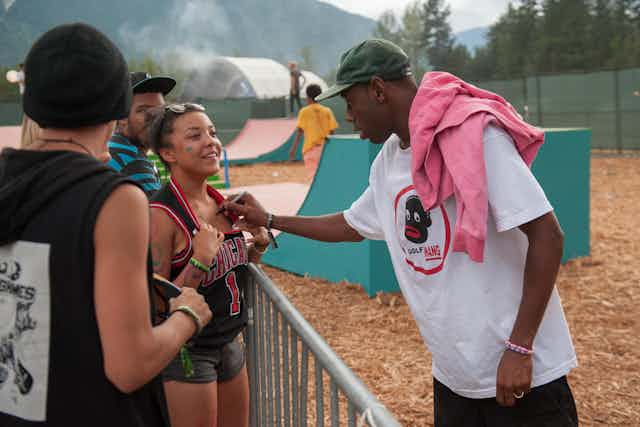American rapper Tyler the Creator (full name Tyler Gregory Okonma) made headlines last week when he cancelled what was to be his upcoming Australian tour. He did so due to a campaign by the feminist grassroots activist group Collective Shout, who sought to block the rapper’s visit due to his sexually violent lyrics about women (note: while the rapper cancelled his Australian visit without intervention by Australian immigration, he was banned by New Zealand immigration in January 2014).
The intersection of arts and activism is not new, but social activist movements using digital media to cross between online/ offline worlds are changing the way it gets done. This burgeoning field of “creative activism” also raises the question of whether, rather than democratising social relations, the internet is offering a dangerously anonymous new landscape for nurturing further inequality.
The campaign against Tyler the Creator didn’t play out nicely. The director of Collective Shout received death threats from the rapper’s fans and online commentary was vicious and abusive. Such backlash typifies the power of contemporary tech-savvy arts activism and highlights both the advantages and disadvantages of online/ offline worlds crossing and colliding.
While some similar campaigns have been less successful, and some may argue that the Eastern European feminist juggernaut Femen has been doing it better on a global scale since 2008, Collective Shout also cleverly used social media to publicise the death threats that were received as part of the campaign.

As one Facebook user commented: “Violent rape fantasy is not art.” Definitions of art aside, what is clear is that hybrid activism – whether protesting against or incorporating creative expression – is gaining momentum.
Some choose to call this new hybrid approach “creative activism”, while others use “arts” and “artistic” activism interchangeably with creativity, including the New York School for Creative Activism and Brooklyn-based Creative Resistance.
In Australia, the Creative Activists website seeks to:
develop events, exhibitions and other creative projects that deliver a triple bottom line benefit by offering a creative outlet that benefits artists, businesses and charities or causes in need.
[Alex Kelly](https://en.wikipedia.org/wiki/Alex_Kelly_(filmmaker) is one Australian artist-activist who uses arts and social media to push for social change. When not working for Naomi Klein’s New York-based climate-change non-profit organisation This Changes Everything, or spearheading anti-fracking initiatives in Alice Springs, where she lives, Kelly gives speeches like the one she made recently at the Australian 2970 Degrees summit titled Radically Re-Imagining the World as Climate Changes.
But millenial activists such as Kelly work with both large and small-scale strategies to raise consciousness and create change on a global scale. In her 2970 Degree summit speech, Kelly calls for fear to be replaced by:
work that triggers conversations, that makes us think about other possibilities – ideas beyond capitalism, beyond closing our borders, towards a more inclusive, more just, wiser and more creative world. A world that we can all see ourselves in and that we are excited to engage to fight for.
Her contemporaries, such as Michael Premo of New York’s Occupy Sandy (after Hurricaine Sandy in 2012) and also Housing is a Human Right (an arts-informed housing activist organisation that has had large-scale impact on mortgage buy-backs after the 2008 global financial crisis), believe that total structural change in the western world is not an impossibility, and art is the way to do it.

As Kelly told me recently as part of a current study on arts and activism:
Some people think of art in activism as the cake decorators that just come in make everything look good, and then other people have deep understanding of what is a cultural strategy. And it’s not just about the art as objects or as banners, or as pieces that decorate the cake, but about this really deep embodiment of ideas in a poetic way, which can transfer ideas more deeply than just straight information.
As I’ve written elsewhere, including here on The Conversation, the Peoples’ Puppets of Occupy Wall Street is at the vanguard of this kind of work. They continue to meet the needs of those concerned with pressing issues such as climate, race, gender and fair wages.
Most recently, they protested for an increase in wages for fast food workers – and won. They are explicit that artful approaches are able to accomplish what other strategies cannot, by touching hearts, not just minds.
Yet new forms of gendered and political conflict, such as that which confronted Tyler the Creator, are appearing online at an accelerating rate, and some feel that the internet, rather than democratising social relations, is only offering a dangerously anonymous new landscape for creating further injustice and inequality.
DIY and maker-cultures, new virtual landscapes and embodiments, and multi-sensory digital communities can be a doorway toward that “more inclusive, more just, wiser and more creative world” that Alex Kelly and her next wave urge us to consider, if we continue to combine real-world action with the power of digital networking.
The choice is ours: will we get mired in online fear-mongering, bullying and life-threatening trolling, or rise to creative online/ offline worlds we can yet only imagine?

